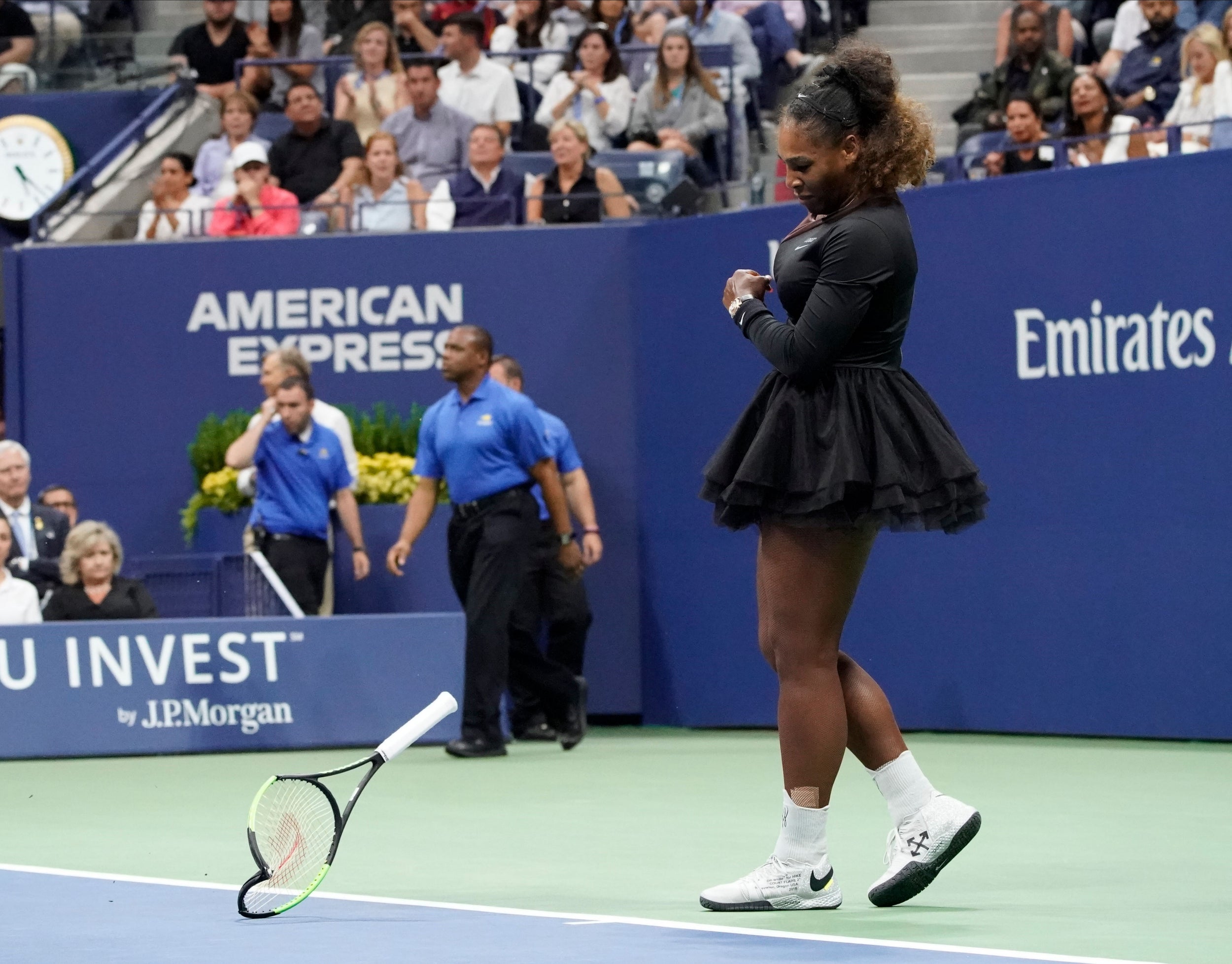Naomi Osaka makes history with US Open victory as Serena Williams loses her cool in heated final
Williams suffered an extraordinary on-court meltdown as Osaka went on to become the first Japanese player to claim a Grand Slam title

Your support helps us to tell the story
From reproductive rights to climate change to Big Tech, The Independent is on the ground when the story is developing. Whether it's investigating the financials of Elon Musk's pro-Trump PAC or producing our latest documentary, 'The A Word', which shines a light on the American women fighting for reproductive rights, we know how important it is to parse out the facts from the messaging.
At such a critical moment in US history, we need reporters on the ground. Your donation allows us to keep sending journalists to speak to both sides of the story.
The Independent is trusted by Americans across the entire political spectrum. And unlike many other quality news outlets, we choose not to lock Americans out of our reporting and analysis with paywalls. We believe quality journalism should be available to everyone, paid for by those who can afford it.
Your support makes all the difference.Naomi Osaka became the first Japanese player to win a Grand Slam title here at Flushing Meadows, but the 20-year-old’s stunning 6-2, 6-4 victory over Serena Williams in the final of the US Open was overshadowed by an extraordinary row between her opponent and Carlos Ramos, the umpire.
Williams, who has a history of clashes with officialdom here, was given three code violations during the match, the third of which resulted in her being deducted a game when trailing 4-3 in the second set.
The 23-times Grand Slam champion had a series of furious exchanges with Ramos, who had handed out a first penalty because of what he saw as illegal coaching from the sidelines by Patrick Mouratoglou, her coach.
That infuriated Williams, who told Ramos she was not a cheat. When the umpire gave her a second violation for smashing her racket after dropping serve, the penalty was a point deduction. Williams called him “a thief” for deducting the point, upon which Ramos issued her third code violation, this time for verbal abuse, and deducted a game.

In chaotic scenes, with the crowd voicing their anger, Williams demanded to see Brian Earley, the tournament referee. An increasingly upset Williams told Earley that male players say far worse without receiving similar punishment and said she was being penalised “because I’m a woman”.
Her protests were to no avail, however, and although Williams held to love in the next game, Osaka served out to secure her victory.
It was impossible not to feel sorry for Osaka, who was in tears afterwards. The 20-year-old Japanese is such a talent that this is likely to be the first of many similar triumphs, but this occasion will be remembered mostly for other reasons than her first Grand Slam title.
The match brought back memories of other incidents here involving Williams. In 2004 she had major rows over line calls in a match against Jennifer Capriati and in 2009 her semi-final against Kim Clijsters ended when she was deducted a point on match point – and therefore lost the match – after a profanity-laden tirade against a line judge.
In losing the 2011 final to Sam Stosur, Williams was given a code violation for verbally abusing the umpire, who had awarded a crucial point to her opponent because the American had shouted out during the rally.
On this occasion everything escalated from the moment Mouratoglou made a gesture towards Williams which the umpire saw. After the match Mouratoglou admitted that he had been trying to coach her, though Williams insisted both during and after it that she never used on-court coaching, which is allowed on the women's tour but not at Grand Slam tournaments.

“I don’t cheat to win,” Williams told Ramos after he had issued the code violation. “I’d rather lose.”
Williams added: “Just because I look at my box, it may have looked like I was getting coaching, but I'm telling you, that's not what I do.”
After receiving the second code violation for smashing her racket, having dropped her serve immediately after breaking Osaka for the only time early in the second set, Williams told the umpire: “You owe me an apology. I have never cheated in my life. I have a daughter and I stand for what is right.”
She also told him: “You are attacking my character and you owe me an apology. You are a liar. You will never umpire on a court of mine as long as you live. Give me my apology. You stole a point from me and you’re a thief too.”
At the presentation ceremony, where Williams put her arm around a tearful Osaka, there were even boos from the crowd for Katrina Adams, the president of the United States Tennis Association, though they turned to cheers when she described Williams as “the champion of all champions”. Adams added: “This momma is a role model and respected by all.”

A tearful Williams declined to answer the interviewer’s questions at the ceremony but said to the crowd: “I just want to tell you guys she played well and this is her first Grand Slam.”
Williams’ words brought prolonged cheers and applause before she continued: “I know you guys were here rooting and I was rooting too, but let’s make this the best moment we can and we’ll get through it. Let’s give everyone the credit where credit is due. Let’s not boo any more. We’re going to get through this and let’s be positive. Congratulations, Naomi. No more booing.”
She added: “I really hope to play here again. We’ll see. It’s been a tough year for me.”
Osaka also chose not to answer the on-court interviewer’s first question. “I’m sorry,” she said. “I know everyone was cheering for her. I’m sorry it had to end like this.” She later said that it had always been her dream to play Williams in the final and told the American that she was very grateful for having had the opportunity to do so.
Mouratoglou admitted in a post-match interview on ESPN that he had been coaching his player, but said he did not think Williams had been looking at him at the time. He also said that Osaka’s coach, Sascha Bajin, had been doing the same, as do coaches everywhere.

“The star of the show has been once again the chair umpire,” Mouratoglou said on Twitter. “Second time in this US Open and third time for Serena in a US Open final. Should they be allowed to have an influence on the result of a match? When do we decide that this should never happen again?”
Having been told that Mouratoglou had admitted coaching her, Williams said at her post-match press conference: “What is he talking about? Because we don't have signals. We have never discussed signals. I don't even call for on-court coaching [on the WTA tour]. I'm trying to figure out why he would say that.”
She also said that she had seen men call umpires “several things” and added: “I'm here fighting for women's rights and for women's equality and for all kinds of stuff. For me to say 'thief' and for him to take a game, it made me feel like it was a sexist remark. He's never taken a game from a man because they said 'thief'.
“For me it blows my mind. But I'm going to continue to fight for women and to fight for us to have equal [rights], like [Alize] Cornet should be able to take off her shirt without getting a fine. This is outrageous.
“I just feel like the fact that I have to go through this is just an example for the next person that has emotions, and that want to express themselves, and want to be a strong woman. They're going to be allowed to do that because of today. Maybe it didn't work out for me, but it's going to work out for the next person.”
Join our commenting forum
Join thought-provoking conversations, follow other Independent readers and see their replies
Comments